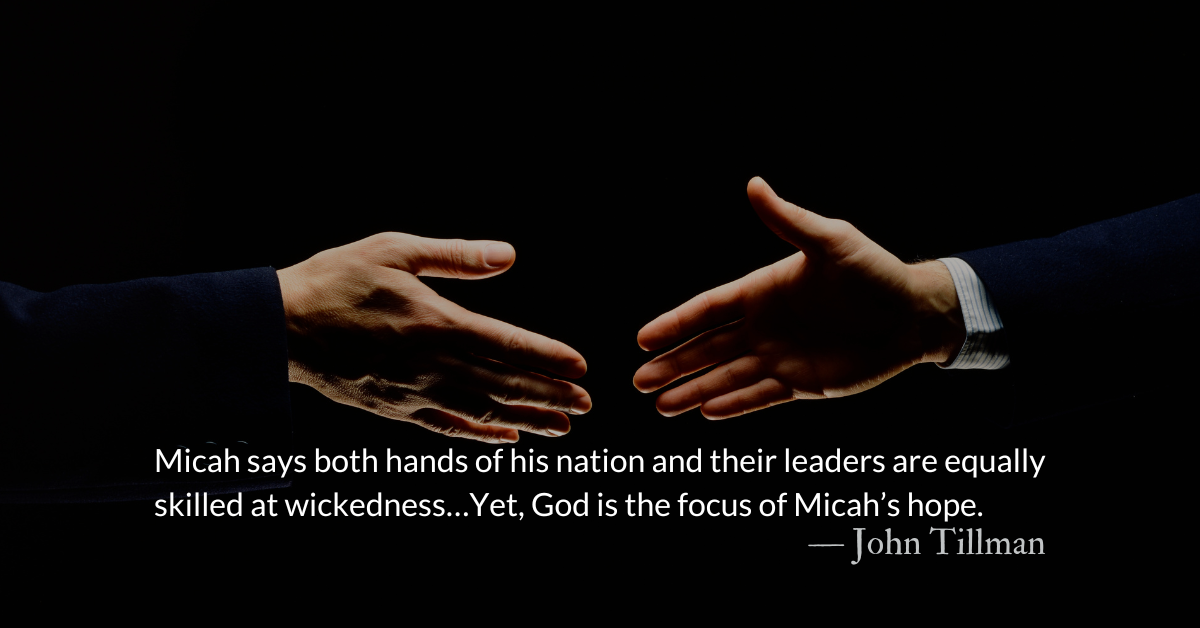Relevant Text: Job 9:32-33
Full Text: Job 9; Rom. 13
Weeping | Yesterday, in Romans 12, we read, “Weep with those who weep” [1]. Today, in Job 9, we see how NOT to do that. Job’s friends sat with him, but never shared in his sorrow. Instead, they stood back and offered theology, suggesting that great suffering resulted from great sin. But Job knew better: “If I say, ‘I will forget my complaint, I will put off my sad face, and be of good cheer,’ I become afraid of all my suffering” [2]. Instead, he wanted the impossible – to take God to court: “For he is not a man, as I am, that I might answer him, that we should come to trial together. There is no arbiter between us, who might lay his hand on us both” [3].
Suffering | Job’s suffering was not extraordinarily unique. Mark Dever reflects, “Perhaps Job suffered more suddenly than any of us have suffered. But in the end, he did not suffer more comprehensively than we will suffer” [4]. Indeed, many of our brothers and sisters suffer every day. International Justice Mission writes, “More children, women and men are held in slavery right now than over the course of the entire trans-Atlantic slave trade” [5]. In North Korea, about 100,000 Christians are in prison [6]. The list goes on and on [7].
Sharing | When we weep with those who weep, we show more than friendship; we display the glory and love of God. In fact, to the extent that we don’t enter into others’ suffering, we fail to cultivate a deep longing for their suffering to end. When we share in their pain, however, we come to hate injustice and long for heaven – not merely to end our personal struggles, but also to release our brothers and sisters. As we cry with them, we sound like modern-day Jobs, “Where is the justice?” Yet, in Christ, there is an arbiter between God and us. He became flesh, entered into our suffering, and wept with us [8]. In him, God did not stand back. Jesus proclaimed good news to the poor, liberty to the captives, and the year of the Lord’s favor to the oppressed [9].
Praying | Lord, Things on this side of the tapestry often don’t make sense [10]. Yet, give us a real sense of suffering and a real sense of hope, as we long for the final consummation of your glory at the end of this age. Amen.
____________________________________
FAQs
How can I make a tax-deductible donation? Click here.
How can I get these devotionals in my inbox? Click here.
What is the reading plan this blog is based on? Click here.
____________________________________
Footnotes
[1] Rom. 12:15 ESV | [2] Job 9:27-28 ESV | [3] Job 9:32-33 ESV | [4] Mark Dever. The Message of the Old Testament: Promises Made. Kindle Location 9536. | [5] International Justice Mission. “Our Work: Injustice Today.” If you have yet to discover the work of IJM, I highly recommend you check it out on Facebook or Twitter. When I worked at the State Department, my colleagues and I frequently spoke of IJM as a well-respected, faith-based organization. It works to reform the rule of law as the next field of international development. Most of its employees are lawyers and police officers, investigating cases and bringing perpetrators to justice. | [6] Operation World. North Korea. | [7] This is an AMAZING interactive map about the worldwide Christian population published by Pew Forum in 2012: here. Also, published by Open Hands, this is their 2012 World Watch List with the 50 worst countries to live in as a Christian: here. | [8] See John 11, where Jesus weeps with the sisters of Lazarus – even though he knows that he will raise Lazarus from the dead in three days! Astounding that he wants to weep with them in their sorrow. | [9] See Luke 4:16-30. | [10] This footnote is dedicated to my dear and well-read friends, Barry and Tess Russell, who gave me such insight last weekend into our longing for the end of suffering as expressed in literature. Father Brown (a character in G.K. Chesterton’s mystery novels) once said, “We here are on the wrong side of the tapestry. The things that happen here do not seem to mean anything; they mean something somewhere else. Somewhere else retribution will come on the real offender. Here is often seems to fall on the wrong person” (“The Sins of Prince Saradine.” The Complete Father Brown. Kindle Location 2710). Similarly, in The Brothers Karamazov by Fyodor Dostoyevsky, the priest said, “Let me make it clear that, like a babe, I trust that the wounds will heal, the scars will vanish, that the sorry and ridiculous spectacle of man’s disagreements and clashes will disappear like a pitiful mirage, like the sordid invention of a puny microscopic, Euclidean, human brain, and that, in the end, in the universal finale, at the moment universal harmony is achieved, something so magnificent will take place that it will satisfy every human heart, allay all indignation, pay for all human crimes, for all the blood shed by men, and enable everyone not only to forgive everything but also to justify everything that has happened to men.”






